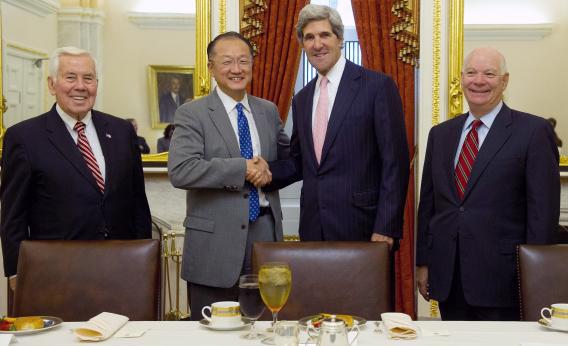Why are most panels in D.C. five guys in suits? That’s the question Anne Kim asks in this month’s Washington Monthly, and the clip art used to illustrate her piece, which I can nearly guarantee Kim didn’t pick herself, points to one major reason why. It’s a woman wearing glasses and showing massive cleavage in a tank top that says, “Think”—in case the glasses didn’t tip you off to the fact that she’s supposed to be a sexy nerd. When you live in a society that values women more for their bodies than their brains, female underrepresentation in the smarty-pants professions is the entirely predictable result.
Of course, it’s hard to fill out a 1,000 word piece with that rather obvious observation, so Kim kicks around a few more possibilities. There’s the perennially popular argument that women are doing all this sexism to themselves by “self-selecting” out of the think tank jobs, a possibility that Kim thankfully doesn’t take too seriously. Then there’s the notion that it’s just a time lag; think tanks are primarily led by older people from a generation where women hadn’t yet made many inroads. But that really can’t be it, either, because women are still way underrepresented in the kind of jobs that lead one to be a senior fellow at a think tank in middle age. So that basically leaves door No. 2: It’s sexism. Women are underrepresented in nearly every kind of policy job you can have in D.C., and in the few arenas where women do dominate, the issues they work on take a hit in esteem.
And, indeed, there are some arenas in which women dominate—such as social policy, education, and, of course, abortion rights. In fact, you’d be hard pressed to find many prominent male experts in these areas. But do women truly self-select into these policy areas, or is there an implicit glass ceiling that makes it tougher for women to achieve prominence in other fields? Many of the biggest and “sexiest” macroeconomic policy areas that drive the most attention—think tax, budget, and finance—are largely the province of men. An unfortunate implication of this gender split is that there are “Daddy” issues and “Mommy” ones— i.e., testosterone-charged issues involving trucks, money, and bombs, and “softer” issues like welfare and poverty.
I’d argue that it’s not that women are stuck with “soft” issues, but also that issues become “soft” because they’re associated with women. I highly doubt anyone thought poverty was a soft issue in the ‘60s when the prominent voices on the topic were manly men like Martin Luther King Jr. But once the topic became feminized, it got downgraded in importance compared to something like foreign policy. Which creates a vicious cycle, because men tend to shun jobs dealing with feminized issues, leaving women to snatch up the opportunities that are available to them, which makes the issue seem even more feminine.
